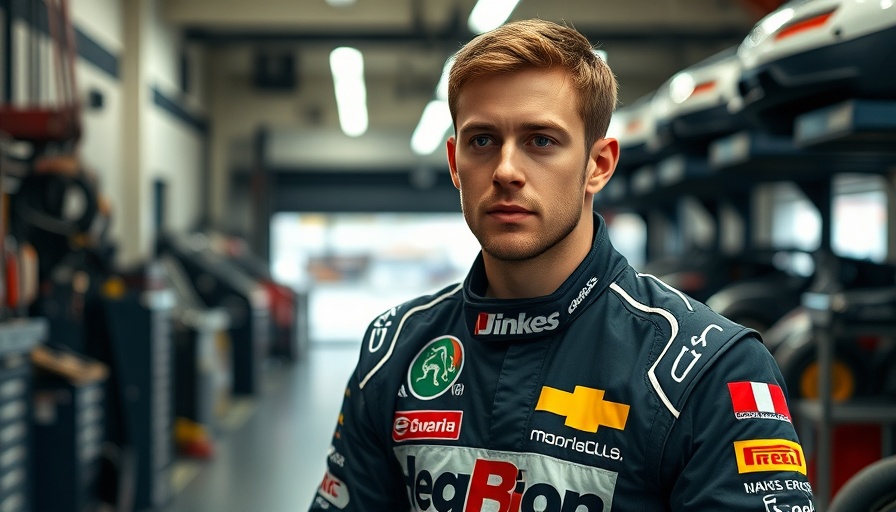
The Price of Retaliation: Cindric's Fine and Points Loss
In a shocking development in the NASCAR world, Austin Cindric has been penalized both financially and competitively for his aggressive driving tactics during the most recent race at Circuit of the Americas (COTA). Following an altercation with fellow driver Ty Dillon, Cindric was fined $50,000 and docked 50 points, a decision that reflects NASCAR's firm stance against unsafe driving behaviors.
The incident occurred early in the race when Cindric, driving for Team Penske, found himself run off the track by Dillon. In response, Cindric retaliated by hooking Dillon's car in the rear, an action that sent Dillon spinning onto the frontstretch. Luckily, Dillon avoided a more severe outcome when he narrowly escaped being hit by oncoming cars. This incident has stirred significant discussions about the line between competitive spirit and reckless driving in NASCAR racing.
NASCAR's Stance on Safety and Fair Play
NASCAR has a history of imposing penalties for dangerous driving, especially when it comes to retaliatory actions that could endanger fellow drivers. According to officials, spinning another driver poses significant risks, especially at higher speeds on oval tracks. However, Cindric's incident at COTA—a road course with lower speeds—resulted in a different type of penalty. NASCAR opted against a race suspension, highlighting the lower speeds and tighter confines of the course as mitigating factors.
This decision aligns with NASCAR's broader goal of maintaining safety while preserving the competitive nature of the sport. Past instances, such as the suspensions of Bubba Wallace and Chase Elliott for similar offenses, indicate how seriously NASCAR takes driver safety and the importance of maintaining racing integrity.
Analyzing the Impact on Cindric's Season
With this penalty, Cindric drops from 11th to 35th in the championship standings—an unfortunate blow for a driver still establishing himself in the top-tier series. This setback could potentially impact his performance in upcoming races, particularly as he heads to Phoenix Raceway this weekend. For Cindric, this serves as a harsh reminder that actions on the track have consequences that extend beyond immediate competition.
A Historical Perspective: Retaliation in Racing
Retaliatory driving isn't a new phenomenon in NASCAR; it’s a part of the sport’s competitive fabric. For decades, drivers have had moments of conflict, often leading to spins and crashes. This particular penalization is part of a growing trend in NASCAR to curb aggressive driving tactics, ensuring safety for both drivers and fans alike. Historical cases, such as those involving past NASCAR legends, underline how these issues remain relevant even today, bringing to light an ongoing debate within the community about how best to enforce competitive integrity and safety.
The Fan Perspective: Insights from the Stands
For fans, incidents like these spark lively discussions about driver accountability and racing ethics. While many understand the thrill of competitive racing, they often express concerns when aggressive driving leads to dangerous situations. They want to see drivers race hard but also keep safety as a priority. The backlash against Cindric from fans has been immediate, with many eager to see how he responds in future races. The balance between entertaining racing and ensuring the safety of all competitors continues to fuel conversations among die-hard NASCAR enthusiasts.
Looking Forward: What Can Cindric Learn?
As he prepares for the upcoming races, Cindric might take this as a moment for reflection and growth. Learning to manage competitive spirit without tipping into recklessness is crucial for his development. NASCAR's image relies on creating an exciting yet safe environment. Drivers who can navigate these tricky waters often come out stronger in the long run. For aspiring racers watching closely, this incident serves as a powerful lesson on the value of possessing not just talent, but also patience, strategy, and respect for fellow competitors.
Fan engagement remains invaluable in sports like NASCAR, where the relationship between drivers and their audience is symbiotic. Moving forward, Cindric’s actions both on and off the track will need to resonate positively with fans to repair any damaged goodwill.
As Cindric gears up for Phoenix, fans are left wondering: How will he turn this moment into a catalyst for success? In the demanding world of NASCAR, every race not only counts for points but also influences how fans perceive their favorite drivers.
 Add Row
Add Row  Add
Add 




Write A Comment